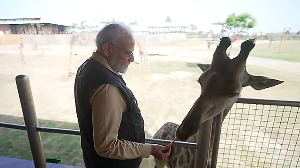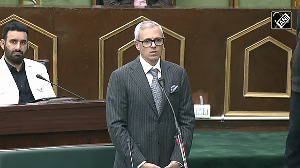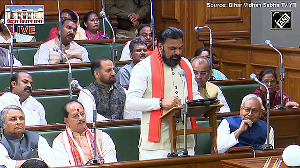Budget 2004-05 could become a casualty if general elections are advanced to May 2004, because both an early election and a full Budget is a parliamentary impossibility.
Though finance ministry officials were going ahead with the job of presenting the Budget in February, top government sources said the Centre might have to resort to a vote-on-account to accommodate the expenditure requirements for the first quarter of the next fiscal in case of early general elections.
The sources said no decision on the matter had been taken yet, but if elections were to be advanced, a decision could not be postponed beyond end-January or early February.
Sources in the ministry of parliamentary affairs said the Centre could be accused of breaching the parliamentary rules of procedures if it tried to bypass the standing committees to hasten the Budget passage.
In addition, the members of each House have to be given 21 days notice before a session is summoned. If Parliament assembles, say on February 19, this will mean that the Cabinet will have to work out the entire schedule latest by mid-January.
This includes finalising the dates for presentation of the Budget, rail Budget and the motion of thanks to the President for his address to the joint session of Parliament. Therefore, a decision on elections has to be finalised by mid-January.
Government sources said the political odium associated with votes on account passed by previous governments would not attach to this government.
"Those who want early elections forward two basic arguments: that we don't know what the monsoon will bring; and that the Prime Minister's standing both in India and internationally is at its best now. They naturally want to capitalise on this, " a top government source said.
These sources did not agree that a vote-on-account would signal an infirm or weak government. "We've run the government for five years. If elections are called, there has to be a vote on account. That's all there is to it," they said.
Within the finance ministry, the expenditure department is, however, going ahead with its rounds of meetings with the central ministries to firm up their financial demand for the next fiscal.
The ministry has also held meetings with the industrial and other lobby groups to begin work on the tax package for 2004-05.
This, however, is no indication that the full Budget will be presented. In 1991, Yashwant Sinha's team in the finance ministry had finalised the full Budget but could not present it, as the government fell.
The decision on the vote-on-account was taken less than a week before the scheduled date of Budget presentation.
Constitutional experts were divided on the issue. Shardul Shroff, partner at the legal firm of Amarchand Mangaldas said it would be constitutionally inappropriate for the government to convene an "emergency session" to pass a Budget.
With uncertainty over whether the government would be able to pass the policy initiatives spelled out in the Budget, it is not advisable for the government to steamroll the propositions in a hurry.
Sanjay Agarwal, additional standing counsel for the government, however, said the move was legally possible.
The nineties saga
- March 1991: Vote-on-account as Chandrashekhar government falls after Congress withdraws support.
- July 1991: Historic Budget by the architect of reforms.
- February 1996: Vote-on-account as general elections are called.
- July 1996: Deve Gowda government presents Budget.
- February 1998: Vote-on-account as Gujral government falls.
- June 1998: NDA government presents Budget.
- February 1999: Budget passed though NDA government falls.
- February 2004: Watch this space.






 © 2025
© 2025